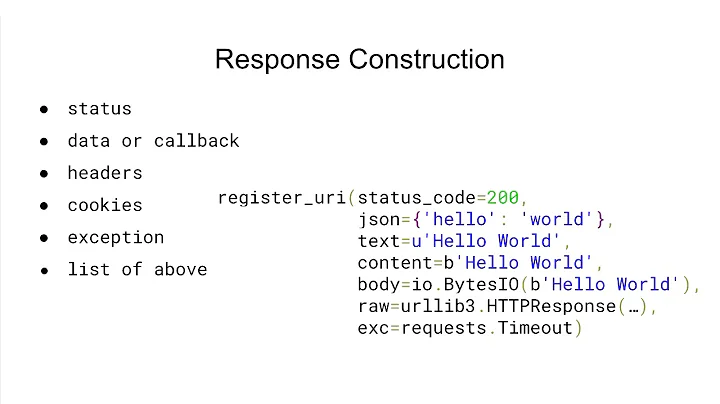Unit testing a python app that uses the requests library
Solution 1
It is in fact a little strange that the library has a blank page about end-user unit testing, while targeting user-friendliness and ease of use. There's however an easy-to-use library by Dropbox, unsurprisingly called responses. Here is its intro post. It says they've failed to employ httpretty, while stating no reason of the fail, and written a library with similar API.
import unittest
import requests
import responses
class TestCase(unittest.TestCase):
@responses.activate
def testExample(self):
responses.add(**{
'method' : responses.GET,
'url' : 'http://example.com/api/123',
'body' : '{"error": "reason"}',
'status' : 404,
'content_type' : 'application/json',
'adding_headers' : {'X-Foo': 'Bar'}
})
response = requests.get('http://example.com/api/123')
self.assertEqual({'error': 'reason'}, response.json())
self.assertEqual(404, response.status_code)
Solution 2
If you use specifically requests try httmock. It's wonderfully simple and elegant:
from httmock import urlmatch, HTTMock
import requests
# define matcher:
@urlmatch(netloc=r'(.*\.)?google\.com$')
def google_mock(url, request):
return 'Feeling lucky, punk?'
# open context to patch
with HTTMock(google_mock):
# call requests
r = requests.get('http://google.com/')
print r.content # 'Feeling lucky, punk?'
If you want something more generic (e.g. to mock any library making http calls) go for httpretty.
Almost as elegant:
import requests
import httpretty
@httpretty.activate
def test_one():
# define your patch:
httpretty.register_uri(httpretty.GET, "http://yipit.com/",
body="Find the best daily deals")
# use!
response = requests.get('http://yipit.com')
assert response.text == "Find the best daily deals"
HTTPretty is far more feature-rich - it offers also mocking status code, streaming responses, rotating responses, dynamic responses (with a callback).
Solution 3
You could use a mocking library such as Mocker to intercept the calls to the requests library and return specified results.
As a very simple example, consider this class which uses the requests library:
class MyReq(object):
def doSomething(self):
r = requests.get('https://api.github.com', auth=('user', 'pass'))
return r.headers['content-type']
Here's a unit test that intercepts the call to requests.get and returns a specified result for testing:
import unittest
import requests
import myreq
from mocker import Mocker, MockerTestCase
class MyReqTests(MockerTestCase):
def testSomething(self):
# Create a mock result for the requests.get call
result = self.mocker.mock()
result.headers
self.mocker.result({'content-type': 'mytest/pass'})
# Use mocker to intercept the call to requests.get
myget = self.mocker.replace("requests.get")
myget('https://api.github.com', auth=('user', 'pass'))
self.mocker.result(result)
self.mocker.replay()
# Now execute my code
r = myreq.MyReq()
v = r.doSomething()
# and verify the results
self.assertEqual(v, 'mytest/pass')
self.mocker.verify()
if __name__ == '__main__':
unittest.main()
When I run this unit test I get the following result:
.
----------------------------------------------------------------------
Ran 1 test in 0.004s
OK
Solution 4
Missing from these answers is requests-mock.
From their page:
>>> import requests >>> import requests_mockAs a context manager:
>>> with requests_mock.mock() as m: ... m.get('http://test.com', text='data') ... requests.get('http://test.com').text ... 'data'Or as a decorator:
>>> @requests_mock.mock() ... def test_func(m): ... m.get('http://test.com', text='data') ... return requests.get('http://test.com').text ... >>> test_func() 'data'
Solution 5
using mocker like in srgerg's answer:
def replacer(method, endpoint, json_string):
from mocker import Mocker, ANY, CONTAINS
mocker = Mocker()
result = mocker.mock()
result.json()
mocker.count(1, None)
mocker.result(json_string)
replacement = mocker.replace("requests." + method)
replacement(CONTAINS(endpoint), params=ANY)
self.mocker.result(result)
self.mocker.replay()
For the requests library, this would intercept the request by method and endpoint you're hitting and replace the .json() on the response with the json_string passed in.
Related videos on Youtube
Chris R
I'm a software developer and inveterate geek (like many here, I suspect). For work I use so many tools I usually can't remember them all, but recently they've been heavily Python/Java. C, Java/J2EE, various scripting and release engineering tools figure heavily in the list as well.
Updated on July 05, 2022Comments
-
Chris R almost 2 years
I am writing an application that performs REST operations using Kenneth Reitz's requests library and I'm struggling to find a nice way to unit test these applications, because requests provides its methods via module-level methods.
What I want is the ability to synthesize the conversation between the two sides; provide a series of request assertions and responses.
-
kgr about 12 yearsSo you need to mock out the REST server?
-
 John Mee about 12 yearswhy does that make unittest unsuitable? Check how the library does its own unit tests; might offer ideas.
John Mee about 12 yearswhy does that make unittest unsuitable? Check how the library does its own unit tests; might offer ideas. -
Romløk over 11 yearsFWIW, the Requests library does its own tests using live URLs (github.com, the authors own domain, etc.).
-
-
 mccc over 8 yearsThat httpretty thing is straight from out of this world, thanks!
mccc over 8 yearsThat httpretty thing is straight from out of this world, thanks! -
Thomas Fauskanger over 6 yearsDo you have any knowledge of how to make this work with
pytest? I tried the exact example you're citing. Ref.: stackoverflow.com/questions/47703748/… -
Unapiedra over 6 yearsIf I remember correctly, I used the decorator. And I think this also worked with pytest.
-
Thomas Fauskanger over 6 yearsI made it work with decorators, but it appears (on my system) that it's in conflict with some other argument, so I had to pass a kw argument to the Mocker, as mentioned in docs. Not sure if this has to do with pytest, but the error that came up mentioned fixtures. Thanks for getting back to the issue.
-
Mohamed Ragab about 6 yearsUpdated URL for the
responsesintro post -
bfontaine over 4 yearsInterestingly, since this was posted as an answer, David Cramer –who authored this library– moved on and founded Sentry, and moved the library with him. This is why on GitHub it’s under the
getsentryorg.






